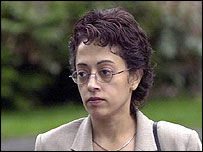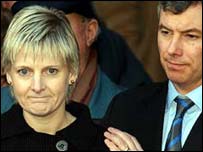Each day for six weeks Trupti Patel walked into Reading Crown Court to hear the deaths of each of her three babies discussed in the most distressing detail.
Accused of their murder, she sat in the dock listening intently to the evidence, her extended family just a few feet away in the public gallery.

Trupti Patel endured a "year of torment"
|
Throughout they have been united in insisting she is not capable of killing her children. On Wednesday, the jury agreed.
The tragedy of this case runs deep. Not only has Trupti Patel had three babies die for sudden unexplained reasons, but she has then been acccused of their murders.
Her son Amar died in December 1997 at three months of age. Two years later Jamie died at just two weeks and one day old.
They were said to be cot deaths, but when Mia died in June 2001 the family was put under investigation. She was three weeks and one day old. She also had four fractured ribs.
The prosecution claimed that Trupti Patel had squeezed the life from her tiny daughter, but during the trial doctors said the ribs might have been fractured as paramedics tried to resuscitate her on the way to hospital.
 It is entirely possible that research in the next few years will explain all sorts of diseases that we can't explain at the moment
It is entirely possible that research in the next few years will explain all sorts of diseases that we can't explain at the moment

Dr David Drucker
Microbiologist
|
At the heart of the case is the assertion made by medical experts for the prosecution that cot death does not run in families, but murder does.
The defence disagreed and Mrs Patel's 80-year-old grandmother travelled from India to give evidence. She lost five babies for unexplained reasons.
There is also scientific evidence that cot death runs in some families.
Dr David Drucker is a microbiologist at Manchester University. He along with colleagues has discovered a faulty gene which means the immune system of some babies doesn't work well enough to fight everyday illnesses.
Infecting organisms
"The baby will respond less well to infection," he said.
"It will respond less well to toxins made by infecting organisms and if those toxins are very poisonous, which they are, then it's not so surprising that some of the babies with what's been called the cot death gene are more vulnerable.
"You would expect them to die with higher frequency than babies who don't have the so-called cot death gene."
It's a complex area of medicine and doctors still have along way to go before they understand the causes of cot death.

There are echoes of the Sally Clark case
|
But Dr Drucker said: "It is entirely possible that research in the next few years will explain all sorts of diseases that we can't explain at the moment.
"In fact I think you'd have to be very stupid to think all the research into DNA is not going to have that effect."
Mrs Patel is not the first mother to face the trauma of being accused of murdering her own children.
Earlier this year Sally Clark was freed by the Court of Appeal after her convictions for murdering her two babies were overturned.
It was only when vital blood tests were found showing the second son had died of natural causes that Sally Clark was able to clear her name.
Her husband Steve believes in these cases mothers are presumed guilty.
"That's a reversal of the burden of proof. In these cases the parents - normally the mother - has to prove how the baby died and of course if the doctors don't know, how can the parents know? All they can say is we don't know."
The Clarks believe every unexplained death of a child should be investigated by a team of a paediatric experts.
This way a standard set of tests would be carried out by people specialised in looking into why a baby has died.
They say this would be the best way of preventing other families living through the nightmares that they and the Patels have faced.

